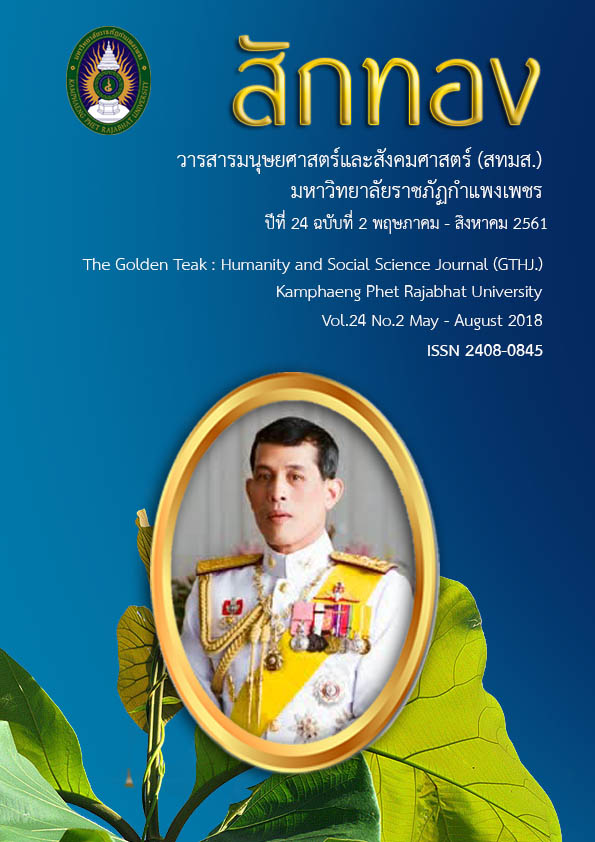The Problem Based Instructional Model to Enhance Critical Thinking Abilities of Teacher Professional Students at Chaiyaphum Rajabhat University
Main Article Content
Abstract
ABSTRACT
This participatory research aimed: 1. to study the problems and guidelines for developing the problem-based instructional model to enhance critical thinking ability of teacher professional students at Chaiyaphum Rajabhat University, 2. to create and develop problem-based instructional model to enhance critical thinking ability, and 3. to evaluate the implementation of problem-based instructional model to enhance critical thinking ability. The participants were (1) a group of 3 researchers, (2) a target group which was 62 first-year of General Science students at the Faculty of Education, Rajabhat Chaiyaphum University in the first semester of the academic year 2016. (3) 2 key informants. The research instruments were (1) an opinion questionnaire (2) a semi-structured interview form, (3) a lesson plan based on problem-based teaching, (4) a teaching record form, (5) a students’ learning behavior observation form, (6) an opinion record form, (7) an achievement test of in professional teaching course, (8) a test of critical thinking ability, (9) an evaluation form of instructional model implementation. The statistics used for analyzing the quantitative data were percentage, mean, and standard deviation. The qualitative data used content analysis technique. The research results were as follows: 1) the instructors taught the students the critical thinking ability at a moderate level. However, there is a high demand for teaching and learning critical thinking. The students had the ability to think critically at a low level. While there is a need for instructional that promotes critical thinking ability at a high level. 2) the conducted instructional model consisted of 4 components; (1) principle, (2) goal, (3) stages: the instructional model had 3 stages; the first stage was before internship, the second stage was during internship composted of 5 stages called IDR2E; identify, do, reflect, expand and evaluate, and the third stage was after internship. And (4) the conditions of using the instructional model were systems of society, supporting, and reaction theory. 3) problem-based instructional model had the efficiency of 83.07/82.55 and students had the mean scores on critical thinking ability and achievement scores at 82.22% and 82.88% which was higher than the criterion and the result of evaluating the instructional model by stakeholders revealed that it was appropriate at a high level.
Article Details
บทความที่ได้รับการตีพิมพ์เป็นลิขสิทธิ์ของวารสาร สักทอง : วารสารมนุษยศาสตร์และสังคมศาสตร์ สถาบันวิจัยและพัฒนา มหาวิทยาลับราชภัฏกำแพงเพชร
ข้อคิดเห็นใดๆ ที่ปรากฎในวารสารเป็นวรรณกรรมของผู้เขียนโดยเฉพาะ ซึ่งมหาวิทยาลัยราชภัฏกำแพงเพชรและบรรณาธิการไม่จำเป็นต้องเห็นด้วย
References
Chaiyaphum Rajabhat, University. (2013). The Manual of Student Planner. Chaiyaphum : n.p.
Chatwirote, B. (2007, January-April). The Development of a Collaborative Learning
Management Model to Promote English Student Teachers’ Teaching Competencies.
The Golden Teak : Humanity and Social Science, 13(1).
Choangchan, A. (2010). The Development of Instructional Model for the Enhancement
of Problem Solving with Critical Thinking Abilities in Science of Fifth Grade
Students. Ph.D. Thesis, Silpakorn University.
Dressel & Mayhue. (2007). Promotiong and AssessingCritical Thinking. [Online]. Available:
http://www.scribd.com/doc/38466787/Assessing and Critical Thinking.
[2007, December 11].
Education Council, Office. (2005). The Learners are the Center of Teaching and Learning.
Bangkok : Kurusapa Ladprao.
Ennis, R. H. (1985). Critical Thinking and the Curriculum. National Forum : Phi Kappa Phi
Journal, 65(1), 28-31.
Johnson, D. W. & Johnson, R. T. (1994). Learning Together and Alone. Cooperative,
Competitive, and Individualistic Learning. (4 th ed.). Edina, Minn : Interaction
Book Company.
Joyce, B. & M. Weil. (2009). Model of Teaching. (5th ed.). Englewood Cliff, NJ : Prentice-Hall.
Kaemmanee, T. (2012). Science of Pedagogy: the Knowledge for Effectiveness
Learning Management Process. (15 th ed.). Bangkok : Dansutha Publisher.
Kitroongrueng, P. (2010). The Development of an Instructional Model using Case Based
Learning Based on Science of Teaching to Enhance Student Teachers’
Critical Thinking. Ph.D. Thesis. Silpakorn University, Thailand.
Kowtrakul, S. (1998). Educational Psychology. (4 th ed.). Bangkok : Chulalongkorn
University.
Nachairit, D. (2014). The Development Blended Learning Model using Collaborative
and Case-based Learning to Enhance Critical Thinking Problem Solving
Thinking and Team Learning of Undergraduate Education Students.
Ph.D. Thesis. Silpakorn University, Thailand.
Nekammanurak, P. (1994). The Development of Critical Thinking Developing Model
for Teachers College Students. Ph.D. Thesis. Chulalongkorn University, Thailand.
Nilphan, M. (2010). Educational Research Methodology. (3 rd ed.). Nakhon Pathom :
Educational Research and Development Center. The Faculty of Education, Silpakorn
University.
Norris, S. P. (1985). Synthesis of Research on Critical Thinking. Educational Leadership, 42,
40-45.
Panich, W. (2012). The Ways for Creating Learning for Students in the 21 Century.
Bangkok : Tathata Publication.
Permanent Secretary, Ministry of Education, Office. (2011). Education Development Plan
of the Ministry of Education (11th ed.) B.E. 2555-2559. Bangkok : Kurusapa Ladprao.
Prabhong, U. (2007). The Development of Clinical Thinking in the Course of Human
Behavior and Self Development for Sakon Nakhon Rajabhat University.
Ph.D. Thesis, Kasetsart University.
Prangsorn, S. (2014). The Development of Instructional Model by Web Quest toward
Problem Based for promoting Problem Solving and Critical Thinking Abilities.
Ph.D. Thesis, King Mongkut’s University of Technology North Bangkok.
Ratana-ampronsopon, U. (2002). Problem Based Learning. Chonburi: Burapha University.
Sa-ard, S. (2010). A Development and Effects of Problem-based Instruction Model
Using Electronic Media toward Learning Achievement and Problem Solving
Ability in Nursing of College Nursing Students under Praboromarajchanok
Institute the Ministry of Public Health. Ph.D. Thesis. King Mongkut’s University of
Technology North Bangkok.
Sinlarat, P. (2007). Sattasila: The Seven Principles for Transforming Education into
Economy Knowledge Based. (2 rd ed.). Bangkok : Chulalongkorn University.
Suwan, C. (2009). A Training Package for the Enrichment of Critical Thinking
Development Process on Sufficiency Economy's Way of Life for Student
Teachers of the Rajabhat Universities in the Upper Northern Region. Ph.D. Thesis,
Chiang Rai Rajabhat University, Thailand.
Teachers Council of Thailand, Secretariat Office. (2010). A Study on the Trend of Thai
Teachers’ Characteristics in the next Decade (B.E. 2562). Bangkok : Surusapa
Ladprao.
Thammabus, M. (2002). The Development of Learning Quality by Using Problem
Based Learning (PBL). Academic Journal, 5(2), 11-17.
Thumsaen, K. (2013). A Development of Instructional Model Based on Critical
Thinking for Physical Education Major Students of Faculty of Education at
Physical Institute. Ph.D. Thesis. Valaya Alongkorn Rajabhat University under the Royal
Patronage.


